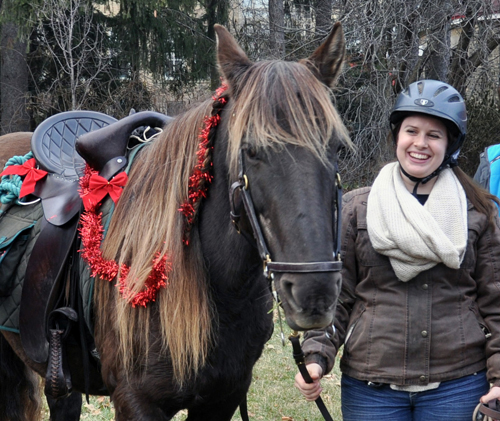
Probiotics are often touted for their gastrointestinal benefits for humans, but could they have a similar effect on dairy cows? That was the question Holly McGill, a recent master’s graduate in agriculture, tried to answer as part of her research on dairy cow nutrition.
During her undergrad at U of G, she did her fourth-year research project with Prof. Brian McBride, Animal and Poultry Science, who later supervised her master’s research. He was studying the effects of supplementing dairy cattle feed with probiotics. McGill’s own research focused on how probiotics improved digestion in a paper titled “The Effect of Direct-Fed Microbials on Nutrient Digestibility in Lactating Dairy Cows.”
When a dairy cow gives birth and begins lactating, she undergoes enormous physiological stress. “That’s a hugely demanding time on her body,” says McGill, adding that extensive research has been done on how to make the transition period easier. “A lot of it has to do with feeding, and how you can keep up her energy levels at that time.”
Shortly before they give birth, dairy cows tend to eat less, which makes them more vulnerable to inadequate nutrition after they calve. Probiotics are believed to help make the nutrients in cattle feed more accessible so the animal doesn’t need to withdraw nutrients from its own reserves.
McGill says proper nutrition “helps to prevent a huge amount of disorders,” such as ketosis, a metabolic condition that causes a negative energy balance when the cow withdraws more energy from its body than from its feed. The additional stress on the cow can reduce milk production and make her vulnerable to other diseases. Ketosis can also have a cumulative effect on the cow’s reproductive health, making it more difficult for her to breed in the future.
Since dairy cows are bred to produce large quantities of milk, their bodies may not be able to keep up with the energy demands of pregnancy and lactation. “Every single cow will have some sort of negative energy balance between when she gives birth and when she’s lactating,” McGill explains. “It’s a natural process, but we’re making sure that we can support her through it the best we can so there’s no illness.”
McGill studied the effects of supplementing feed with lactic acid bacteria to see if they helped maintain healthy bacteria and pH levels in the cow’s rumen. “By promoting a healthy rumen microflora, they are digesting better and they are making more of these nutrients available for her to absorb into the bloodstream to utilize.”
Did McGill feed yogurt to the cows? No, the live-culture powdered supplement was sprinkled on the cows’ regular feed. She tested the supplement on a herd of more than 150 cows in Elora, Ont., and noticed no significant improvement in their digestion. “We saw a little bit of an effect on starch digestibility.”
Growing up in Pickering, Ont., McGill spent more time horseback riding than with cows. She was drawn to U of G because of its veterinary focus, but enrolled in the agriculture program because she was interested in farming and learning more about where food comes from. “I fell in love with it,” she says of her first year in the program. She decided to focus on helping prevent animals from getting sick instead of treating them when they became ill.
McGill also found herself falling in love with the cows. “They’re pretty loveable,” she says with a laugh. “They remind me very much of horses. They each have their own personality.”
After completing her master’s degree in December, she started a new job in January at Guelph-based Alltech as a dairy sales representative. She looks forward to helping farmers maintain the health of their dairy herds.